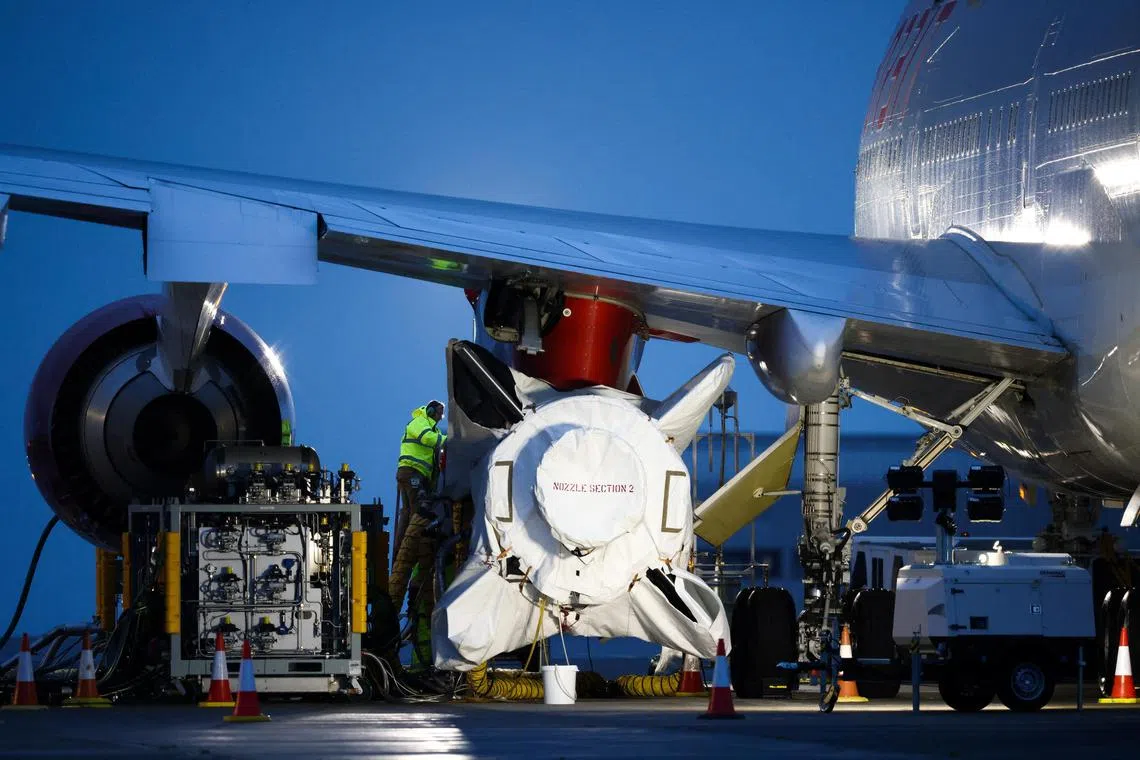Britain’s groundbreaking satellite launch ends in failure
Sign up now: Get ST's newsletters delivered to your inbox

Technicians work on Virgin Orbit's LauncherOne rocket, attached to the wing of Cosmic Girl, a Boeing 747-400 aircraft, at Newquay Airport, on Jan 8, 2023.
PHOTO: REUTERS
NEWQUAY, England - Britain’s attempt to become the first western European nation to launch satellites into space
The “horizontal launch” mission had left from the coastal town of Newquay in south-west England, with Virgin’s LauncherOne rocket carried under the wing of a modified Boeing 747 called Cosmic Girl, and later released over the Atlantic Ocean.
After decoupling from the aircraft, the rocket ignited its engines, went hypersonic and reached space, where it separated and ignited the second-stage boosters, said California-based Virgin Orbit.
“At some point during the firing of the rocket’s second-stage engine and with the rocket travelling at a speed of more than 11,000 miles per hour (17,700kmh), the system experienced an anomaly, ending the mission prematurely,” it said.
The failure deals a further blow to European space ambitions after an Italian-built Vega-C rocket mission failed
The rockets have since been grounded.
Europe has suffered a series of setbacks in the past year, with its key Ariane 6 launcher delayed, access to Russian Soyuz rockets blocked by the Ukraine war, Vega grounded, and now a showcase launch for the burgeoning small launcher industry abandoned.
Virgin Orbit had initially said on Twitter that LauncherOne had reached Earth orbit, a post it later deleted.
“Over the coming days, there will be an investigation by the government and various bodies, including Virgin Orbit,” said Mr Matt Archer, commercial space director at the UK Space Agency.
Virgin Orbit, part-owned by British billionaire Richard Branson, had planned to deploy nine small satellites into lower Earth orbit in its first mission outside its United States base.
The mission had been heralded as a historic first for Cornwall, Britain and Europe, and thousands of enthusiasts watching from beside the runway cheered when Cosmic Girl took off and when they were told the rocket had been deployed.
The crowd quickly and quietly dispersed following the announcement of failure.
The mission failure is the second in Virgin Orbit’s history since its first launch in 2020. It has had four successful missions.
Britain’s hopes of becoming a leading destination for the launch of small satellites remain intact despite the failure of the first mission, said the country’s business minister Grant Shapps on Tuesday.
“Space is difficult,” he told Sky News. “The great thing about this technology is that no one was harmed. It didn’t work. No doubt they’ll pick themselves up, dust themselves off, and they’ll go again.”
Virgin Orbit’s chief executive Dan Hart said in a statement that the group would take corrective actions and hoped to return to orbit as soon as a full investigation had been completed.
Britain says it is the leading non-US manufacturer of satellites, with 47,000 people employed in its space industry, and has called for the development of multiple potential micro-launch sites including two vertical launchpads in Scotland.
Britain’s minister for science, Mr George Freeman, said: “Lots and lots of things have been achieved, and yet the milestone is obviously disappointing. But we will continue to press on, and we will get there in the end.” REUTERS, BLOOMBERG


